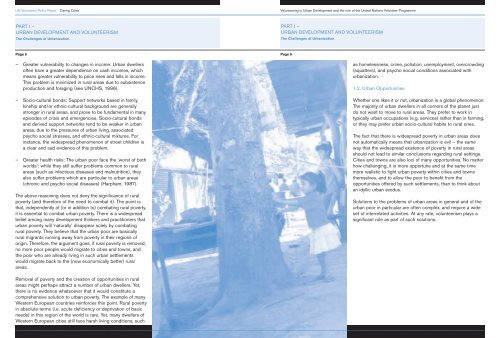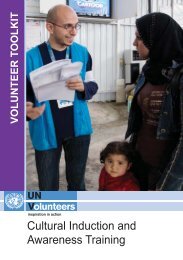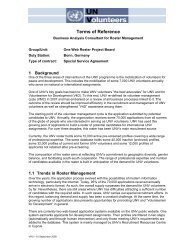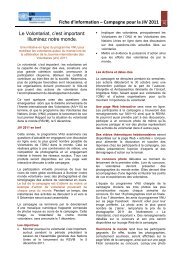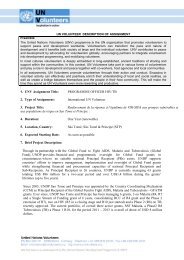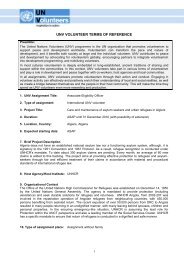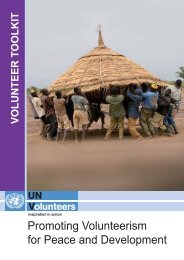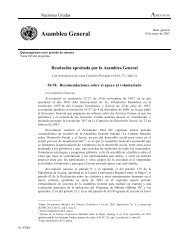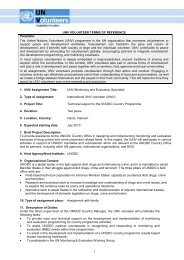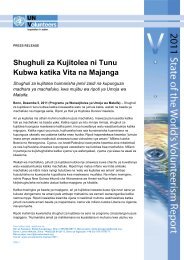View associated PDF document - United Nations Volunteers
View associated PDF document - United Nations Volunteers
View associated PDF document - United Nations Volunteers
You also want an ePaper? Increase the reach of your titles
YUMPU automatically turns print PDFs into web optimized ePapers that Google loves.
UN <strong>Volunteers</strong> Policy Paper ‘Caring Cities’<br />
Volunteering in Urban Development and the role of the <strong>United</strong> <strong>Nations</strong> Volunteer Programme<br />
PART I –<br />
URBAN DEVELOPMENT AND VOLUNTEERISM<br />
The Challenges of Urbanization<br />
PART I –<br />
URBAN DEVELOPMENT AND VOLUNTEERISM<br />
The Challenges of Urbanization<br />
Page 8<br />
– Greater vulnerability to changes in income: Urban dwellers<br />
often have a greater dependence on cash incomes, which<br />
means greater vulnerability to price rises and falls in income.<br />
This problem is minimized in rural areas due to subsistence<br />
production and foraging (see UNCHS, 1996).<br />
– Socio-cultural bonds: Support networks based in family,<br />
kinship and/or ethnic-cultural background are generally<br />
stronger in rural areas, and prove to be fundamental in many<br />
episodes of crisis and emergencies. Socio-cultural bonds<br />
and derived support networks tend to be weaker in urban<br />
areas, due to the pressures of urban living, <strong>associated</strong><br />
psycho social stresses, and ethnic-cultural mixtures. For<br />
instance, the widespread phenomenon of street children is<br />
a clear and sad evidence of this problem.<br />
– Greater health risks: The urban poor face the ‘worst of both<br />
worlds’: while they still suffer problems common to rural<br />
areas (such as infectious diseases and malnutrition), they<br />
also suffer problems which are particular to urban areas<br />
(chronic and psycho social diseases) (Harpham, 1987).<br />
The above reasoning does not deny the significance of rural<br />
poverty (and therefore of the need to combat it). The point is<br />
that, independently of (or in addition to) combating rural poverty,<br />
it is essential to combat urban poverty. There is a widespread<br />
belief among many development thinkers and practitioners that<br />
urban poverty will ‘naturally’ disappear solely by combating<br />
rural poverty. They believe that the urban poor are basically<br />
rural migrants running away from poverty in their regions of<br />
origin. Therefore, the argument goes, if rural poverty is removed,<br />
no more poor people would migrate to cities and towns, and<br />
the poor who are already living in such urban settlements<br />
would migrate back to the (now economically better) rural<br />
areas.<br />
Page 9<br />
as homelessness, crime, pollution, unemployment, overcrowding<br />
(squatters), and psycho social conditions <strong>associated</strong> with<br />
urbanization.<br />
1.2. Urban Opportunities<br />
Whether one likes it or not, urbanization is a global phenomenon.<br />
The majority of urban dwellers in all corners of the planet just<br />
do not want to move to rural areas. They prefer to work in<br />
typically urban occupations (e.g. services) rather than in farming,<br />
or they may prefer urban socio-cultural habits to rural ones.<br />
The fact that there is widespread poverty in urban areas does<br />
not automatically means that urbanization is evil – the same<br />
way that the widespread existence of poverty in rural areas<br />
should not lead to similar conclusions regarding rural settings.<br />
Cities and towns are also loci of many opportunities. No matter<br />
how challenging, it is more opportune and at the same time<br />
more realistic to fight urban poverty within cities and towns<br />
themselves, and to allow the poor to benefit from the<br />
opportunities offered by such settlements, than to think about<br />
an idyllic urban exodus.<br />
Solutions to the problems of urban areas in general and of the<br />
urban poor in particular are often complex, and require a wide<br />
set of interrelated activities. At any rate, volunteerism plays a<br />
significant role as part of such solutions.<br />
Removal of poverty and the creation of opportunities in rural<br />
areas might perhaps attract a number of urban dwellers. Yet,<br />
there is no evidence whatsoever that it would constitute a<br />
comprehensive solution to urban poverty. The example of many<br />
Western European countries reinforces this point. Rural poverty<br />
in absolute terms (i.e. acute deficiency or deprivation of basic<br />
needs) in this region of the world is rare. Yet, many dwellers of<br />
Western European cities still face harsh living conditions, such


